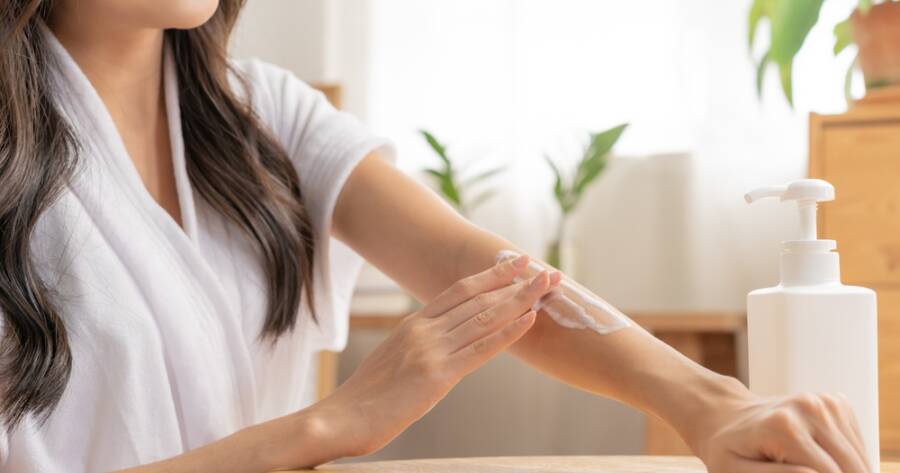Finding effective eczema relief can help manage flare-ups and soothe irritated skin. By incorporating safe and soothing strategies, adults can reduce itching, inflammation, and discomfort, improving their skin’s health and quality of life.
Moisturizing Regularly: The Foundation of Eczema Relief
Regular moisturizing is essential for managing eczema and keeping the skin hydrated and protected. For adults with eczema, using a thick, fragrance-free moisturizer immediately after bathing can lock in moisture and create a barrier against irritants. Creams and ointments are often more effective than lotions, as they provide a thicker, longer-lasting protective layer.1
Ingredients such as ceramides, hyaluronic acid, and glycerin are particularly beneficial for retaining moisture and repairing the skin barrier. It’s important to choose a moisturizer that is free of potential irritants like alcohol, fragrances, and preservatives that can worsen eczema symptoms. Moisturizing should be part of a daily skincare routine, applied at least twice a day, and more often if needed. Consistent moisturizing can help reduce dryness, itching, and inflammation, providing a solid foundation for effective eczema management and relief.
Avoiding Common Triggers to Prevent Flare-Ups
Identifying and avoiding common triggers is crucial for preventing eczema flare-ups. Many adults with eczema find that certain irritants or allergens, such as harsh soaps, detergents, perfumes, and synthetic fabrics, can exacerbate symptoms. Environmental factors like extreme temperatures, humidity changes, and pollutants may also trigger eczema. Stress and certain foods, especially those that cause allergies, might provoke flare-ups in some individuals.2
Keeping a diary to track flare-ups and possible triggers can help pinpoint specific factors that worsen eczema. Once identified, these triggers should be avoided whenever possible. For example, opting for hypoallergenic laundry detergents and wearing soft, breathable fabrics like cotton can minimize skin irritation. By proactively managing environmental and lifestyle factors, adults with eczema can reduce the frequency and severity of flare-ups, leading to more comfortable, clear skin.
Exploring Safe Treatments for Eczema Relief
For those seeking eczema relief, exploring a range of safe treatments is vital to finding what works best for their skin. Over-the-counter options, like hydrocortisone creams and antihistamines, can help alleviate itching and inflammation during flare-ups. For more persistent or severe cases, prescription treatments such as topical corticosteroids, calcineurin inhibitors, or biologic therapies may be necessary under the guidance of a healthcare professional.
In addition to medication, light therapy (phototherapy) has shown effectiveness in reducing eczema symptoms by exposing the skin to controlled amounts of natural sunlight or artificial UV rays.3 For those preferring natural remedies, colloidal oatmeal baths, aloe vera, and coconut oil may offer soothing and moisturizing benefits. It’s essential to consult with a dermatologist to determine the most appropriate and safe treatment options based on the severity of the condition and individual skin needs.
Learn More About Effective Eczema Treatments
Exploring effective eczema treatments can help you manage symptoms and improve your skin’s health. Understanding the various options—from moisturizing routines to medical treatments—enables you to find the most suitable strategies for relief. By staying informed and consulting with healthcare professionals, you can tailor a treatment plan that best fits your needs. Discover more about eczema treatments to achieve clearer, more comfortable skin and enhance your quality of life.

